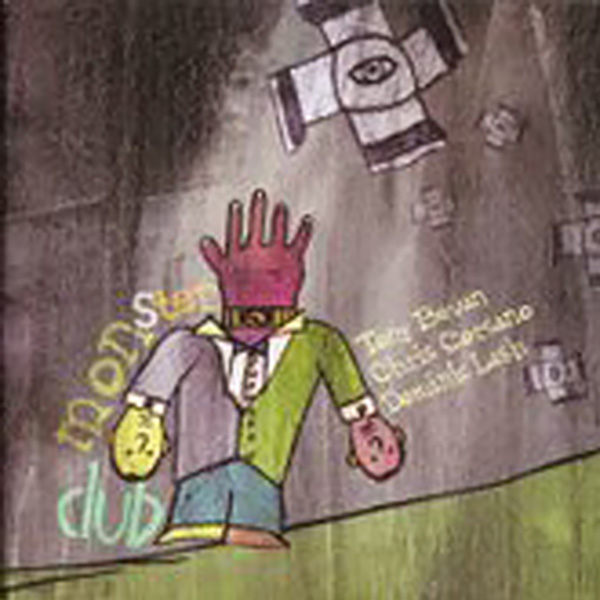
by Tim Owen
February 06, 2009
/ ALBUM
Still tending to the negative in the hoary old debate over the validity of recorded improv? Well here's one to convince you otherwise
Still tending to the negative in the hoary old debate over the validity of recorded improv? Well here’s one to convince you otherwise. Monster Club is a live, fully improvised session of exhilarating intensity?as you might expect?but also of subtlety and, as a package, pleasingly presented with cool non-generic cover art (and how many improv CDs can you say that about?).
For anyone interested in the broad church of alternative music, American drummer Chris Corsano is something of a buzz name. Looking back over the past two or three years, memorable gigs I’ve seen him play have included a couple of performances in his ongoing partnership with Vibracathedral Orchestra’s Mike Flower; a terrifically intense duet with the Dark Magus of noise, Keiji Haino; and a Swiss festival appearance as part of Bjork’s band (reprising his contribution to her Volta album).
Corsano’s kinetic, hyperactive approach initially seems overwhelming. Although it’s instantly impressive, your second impulse might be to wonder whether there’s any method involved. What soon becomes apparent, however, is Corsano’s subtle grasp of dynamics, nowhere more evident than on the panoramic half hour of This Is Murder. And this track, the meat of the album, clearly demonstrates how closely attentive to one another the trio are.
Dominic Lash comes from Oxford, where the recording was made at a club gig. I see from his personal web page that he plays in various ?co-operative groups’ that feature some daunting company, including The Convergence Quartet with Taylor Ho Bynum. He’s not best served by the recording (the only quibble I have overall); you have to pay attention to single out his contribution, but that’s a rewarding approach because he’s a responsive and resourceful contributor, adapting his style instantaneously when the balance between Corsano and Bevan shifts.
Lash, I gather, has come up through the academic, classical crossover scene, while Corsano has undoubtedly benefited from maturing into a quite different alternative/noise community that favours improv and allows ?Jazz’ avenues of expression beyond the traditional. Their partnership here demonstrates that musical boundaries are more porous than ever before. Tony Bevan meanwhile has been one of the rocks of domestic jazz and improv for years, and possibly has a lower profile in certain circles because of it. His playing here can leave no doubts, however, about the authority that comes from experience.
Bevan plays soprano, tenor and bass saxophones on this date. On the brief opening track his Soprano takes on the qualities of a t?rogat?, but his mastery of the unwieldy bass sax quashes any notion that either instrument is adopted for mere effect. Yes, he can blow as hard as Br?tzmann at times (witness his tenor playing on the title track), but Bevan draws on the full breadth of the bass instrument’s range and is capable of great subtlety.
Taking up the bass sax for Murder, he’s initially stabbing and tongue-fluttering, accompanied by Lash’s sinuous sawing of the bass. But after six minutes spent exploring melodic figures he lays down an assertive, R&B-drenched riff that goads Corsano into action. Seven minutes later, as if fatigued, Bevan falls into a staggering, bluesy pattern, but there’s plenty of life in this sequence yet. At the 17 minute mark the trio is laying down a ballad that could almost be extrapolated from Ellington. And there’s the key thing: anyone with an inclusive love of both rock and jazz should find this recording compelling, though improv purists may tut at the refusal to respect the confines of genre. The half hour of Murder, and indeed the whole set, passes all too quickly.
I see from the Foghorn website that this trio will be playing together again, so hopefully sometime soon I can catch them in person. Meanwhile, this CD, unlike some genuinely admired improv recordings, is set for repeat play.
blog comments powered by Disqus